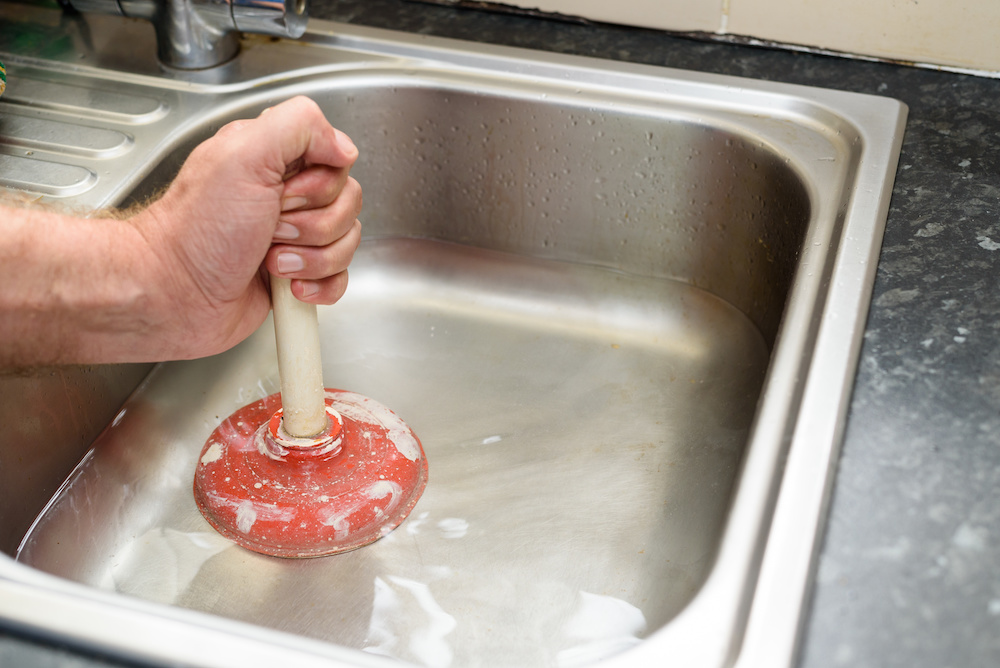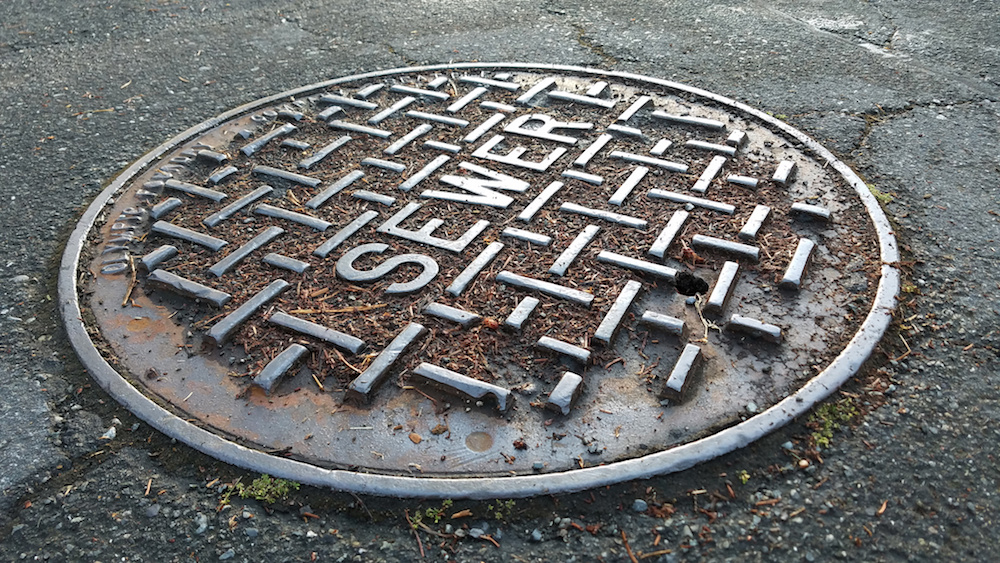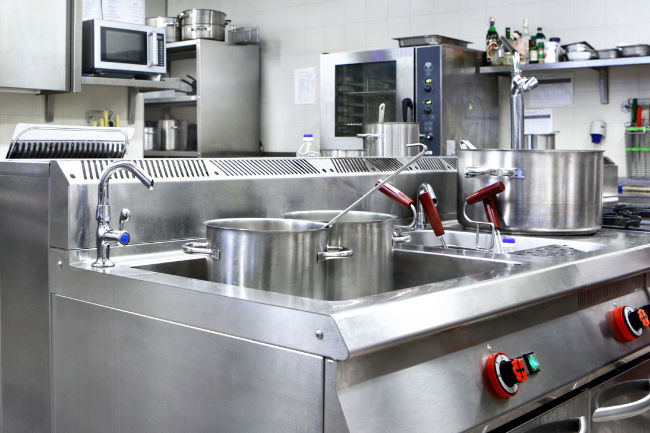How to Prevent Clogs in Commercial Drains
Posted by Express Sewer & Drain Team on

Home drain clogs happen, and they can be a hassle. But because people have to live with them, they’re more careful about what they put down them.
Plus, an average home drain is usually only dealing with a handful of people, whereas a commercial drain may have to accommodate hundreds on a daily basis. In commercial facilities, hot grease gets poured down restaurant kitchen sinks, children's messes go down daycare drains, hair is washed away without abandon at salons, cigarette butts are flushed at bars, and worse.
What Causes Clogs in Commercial Drains
One of the most common problems that plumbers are called to solve is clogged drains. Grease, hair, soap scum, debris, and food particles can all contribute to a clogged drain.
In a commercial setting, where multiple people are using the same drain on a daily basis, these clogs can happen more frequently. Additionally, in commercial settings, there may be more drains that are susceptible to clogs. Not only are clogs likely to occur more frequently due to frequency of use, but more drains can also mean more clogs to cater to.
Types of Commercial Drains & Drain Components
There are several different types of components that can be used in commercial drains, including catch basins, gratings, and trench drains. Catch basins are typically used to collect smaller amounts of water, while gratings and trench drains are usually used in larger drainage systems.
A trough drain is a type of commercial drain that consists of a long, narrow channel. It is typically used to collect water from a large area, such as a parking lot or playground.
Roof drains are another type of commercial drain that is designed to collect water from a building's roof. These drains typically have a large diameter in order to accommodate the large volume of water they are intended to collect.
All of these components play an important role in ensuring that commercial drains function properly.
How to Prevent Clogs in Commercial Drains
When you own, operate, or manage a commercial building, there are a variety of ways you can prevent clogs in your drains.
Educate Employees and Guests
It’d be nice to think that people have learned a thing or two since trying to give their doll or action figure a swim in the toilet as a kid, but that’s often not the case (believe us, you’d be amazed at things we’ve found in drains). So, it’s important to remind people through signage what can be put where.
-
In bathrooms, reminders that only toilet paper can be flushed should be posted, and canisters for hand towels and hygiene products should be easily available.
-
In commercial kitchens, remind employees to avoid casting away grease, which easily builds up in commercial drains, along with stringy foods, egg shells, and pasta. Make sure large trash cans are nearby sinks for easy plate-scrapping.
-
In salons, remind employees to sweep up hair before spraying down floors, as hair can wrap itself around a drain stopper like a lover who won’t let go.
Flush Your Drains Regularly
Drain maintenance is key. Too many commercial facilities wait until it’s too late. Regular flushes using a commercial-grade liquid drain cleaner can prevent the dreaded backup when performed as needed (once a week is ideal for any facility experiencing regular drain usage). Remember to check drain stoppers and clean them; often unwanted gunk gets caught up there and can be the catalyst for the problem.
There are times, however, when the issue isn’t your building—it’s an external line. Of course, only a plumber will know the difference, and even with DIY maintenance, it’s still recommended that a professional plumber makes routine visits even if you think you have a problem with your commercial drains under control.
Use a Strainer or Other Drain Trap

Installing strainers in drains can help to catch hair and other small debris before it has a chance to build up. This product is designed to act as a filter for food going through commercial kitchen drains or hair and soap scum for commercial showers and tubs. Installation is a fairly simple DIY job; be sure to reference the instructions on your individual product.
Apply DIY Methods
If you’re already experiencing a clog, and now it’s an issue of “problem, not prevention,” you can try to take these steps:
Try a Liquid Drain Cleaner
Chemicals can damage drains, so it’s recommended that you try an environmentally friendly one rather than standard drain cleaners. These enzymatic cleaners use clog-eating microorganisms to clear drain blockage. You’d also be surprised what baking soda can do!
Try a Plunger
A standard bathroom plunger can be used on toilets, sinks, and even floor drains. You’ll want to be sure it has a good seal to create strong pressure that gets down deep in the pipes. Work the plunger up and down a number of times, then try the drain again. No luck? It may take a few tries.
Use a Drain Auger
A drain auger, or a “snake,” is a long and flexible metal tube that makes its way through the twists and turns of a pipe. It has a wire head designed to cut through clogs and break up hardened gunk. Snakes for homes are usually short, so commercial property owners or maintenance will want to look for the commercial variety which may extend as much as 50 feet.
Try Air Pressure
Usually available in home improvement stores, these devices work a lot like a plunger but have greater air pressure to open up drains and force clogs out. The pressure can damage piping, so it’s important to know what you are doing before getting started!
Bear in mind that while DIY methods are great for short-term applications, be sure to call a professional for more complicated tasks.
Establish Proper Use Guidelines for All Drainage Systems in the Property
The biggest cause of drain clogs is the improper use of the drain by a building’s occupants. Whether they’re workers or residents, everyone using a commercial property should be made aware of the basic use guidelines for sinks, toilets, and other systems meant to carry water or waste.
In particular, it’s important to establish a list of items that should never be put down a drain, including (but not limited to):
- Grease & oils
- Water-absorbent materials (rice, bread, etc.)
- Solid waste (plastic, metal, etc.)
- Caustic materials that can corrode piping (causes leaks rather than clogs, but still bad news)
- Adhesives (glue, paint, and other materials that can coagulate/congeal in the pipe)
By establishing some ground rules for the use of drains in your commercial property, you can prevent the worst accidental damage, or at least limit your liability if the rules are not followed.
Regularly Maintain Drainage Pipes
Routine maintenance is a must for commercial properties. On a weekly, bi-weekly, and monthly basis, specific preventative maintenance must be done to keep drains clear and working properly.
Two basic measures include:
- Cleaning. At least once a week, or after every few uses, a drain on a commercial property should be checked for and cleaned of buildup. The frequency of these cleanings will vary based on the use of the commercial property.
- Thorough Pipe Inspections. On a monthly basis, piping underneath drains should be carefully checked for excess buildup. In particular, u-bends/traps should be taken apart and checked/cleaned. At least once a year, a thorough check of piping should be conducted, especially if pipes are nearing their maximum use age.
Depending on the use of the commercial property, it may be necessary to use antimicrobial treatments on drains. However, before doing so, it’s important to consult an experienced plumber; some antimicrobial agents may damage plumbing and interfere with septic systems (if present).
Stay Proactive to Prevent Commerical Plumbing Drains and Clogs
Commercial drain clogs are no fun. They can be nasty, and they can cost you a lot of business downtime. If you’re looking for commercial drain plumbing professionals to take care of a problem now, we’re here for you. And if you need maintenance to avoid issues down the road, we have you covered.
Calling a professional plumber like Express Sewer & Drain is always the best move because we can be sure a situation doesn’t go from a minor problem to a major catastrophe. Contact us today to discuss your needs.







